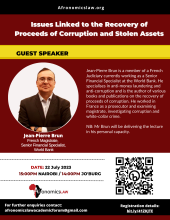Afronomicslaw Academic Forum Guest Lecture Series: Issues Linked to the Recovery of Proceeds of Corruption and Stolen Assets
The Academic Forum is an inclusive and accessible forum that brings together undergraduate and graduate students as well as early career researchers from across the world interested in international economic law issues as they relate to Africa and the Global South. Its goals are to encourage and build core research skills in teaching, research, theory, methods and writing; developing content for Afronomicslaw.org and where possible to encourage authors to submit to the African Journal of International Economic Law; holding workshops and masterclasses on core research skills in teaching, research, theory, methods and writing; and organizing annual poster/essay competitions on international economic law issues.
